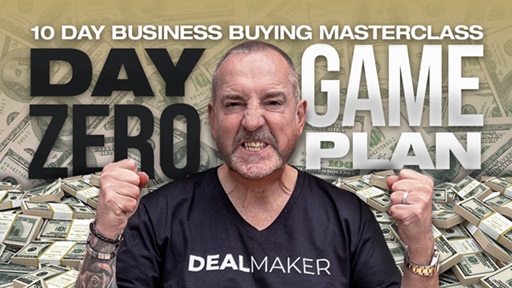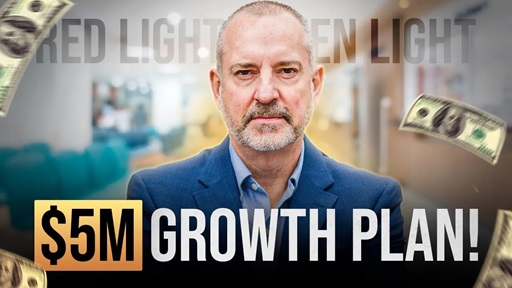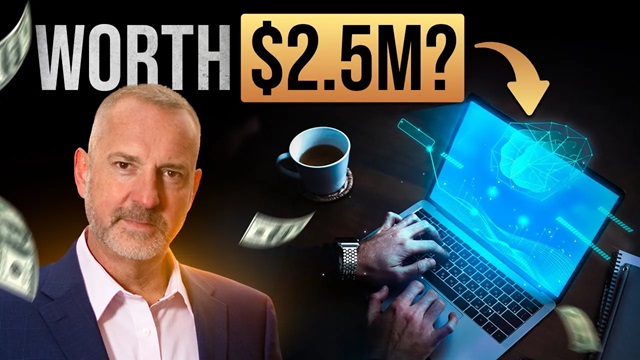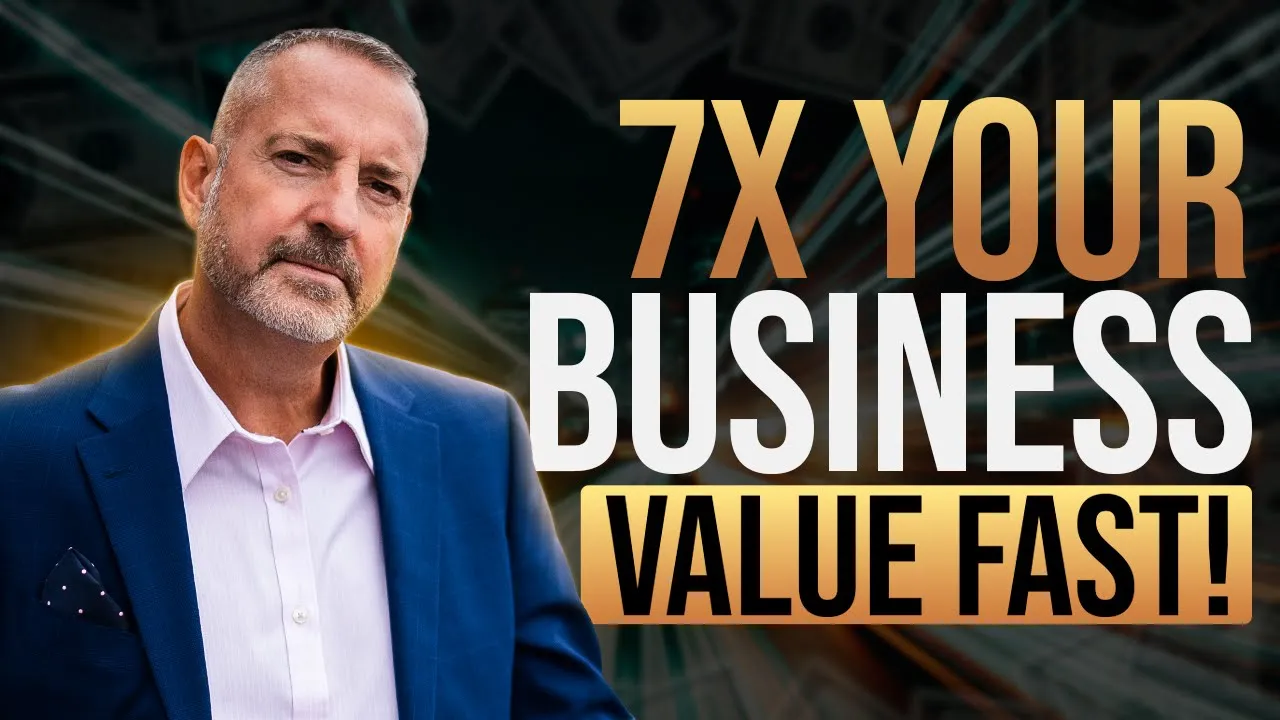Closing Your First Deal – Day 9 | 10 Days To Your First Deal
Closing Your First Deal – Day 9 | 10 Days To Your First Deal
Day 9 – 10-Days to Buying Your First Business | Closing the Deal and General Manager Role by Carl Allen covers the final stages of closing a business acquisition and the crucial role of a General Manager (GM) in running the business post-purchase.
Carl begins by explaining what happens on the closing day. All due diligence and legal documents have been finalized, and once both parties and their attorneys agree, the deal is locked. He describes the signing process, which can be done virtually through DocuSign or in person, and how money flows through an escrow account to ensure the transaction is secure. Once the contract is signed, ownership of the business transfers immediately, and the funds are distributed accordingly.
He then elaborates on the escrow process, explaining how various forms of financing, such as SBA loans or surplus business cash, are placed in escrow before the deal. Only after the contract is signed does the money move, flowing to the seller’s attorney for closing costs and to the business for future operations. This process ensures all financial elements are handled securely, similar to a real estate transaction.
Carl also discusses the importance of a General Manager in growing and running the business post-acquisition. He emphasizes the GM’s role as the integrator who oversees the daily operations, while the owner takes on the visionary role, focusing on strategy, growth, and additional deals. The GM manages critical functions, such as sales, marketing, and finance, and ensures the business operates smoothly.
Finally, Carl encourages incentivizing the GM by offering equity in the business, as this aligns their goals with the owner’s and drives performance. He suggests vesting the equity over time or tying it to financial milestones to protect the owner’s interests. The episode closes with a teaser for Day 10, which will focus on growth strategies, including organic growth and acquisitions.
Full Transcript:
All the due diligence has been done. All of the legal documents have been done. Everything’s ready. The deal then becomes locked.
So once the legal documents have been negotiated, buy side, which is you, sell side, which is the seller, both of their attorneys are kinda happy. All the fine print, all the details have been worked out. All the due diligence has been done. You’re ready to close the deal.
Hey, guys. Carl Howard. Welcome to day number nine of ten days to your first deal. So yesterday, day eight, we were talking about deal execution.
We talked about signing an LOI, what needs to go into that. We talked about proof of funds and term sheets from lenders or investors. They’re gonna partner with you in this deal. And then we talked about building that deal team on a contingent fee basis so that they’ll do most of the heavy lifting for you when it gets to papering the deal and getting it ready for close.
We’re talking about due diligence. We were talking about legal contracts and different legal structures as well. So all that work’s now being done, and it’s closing day. It’s time for you to close the deal and take ownership of the business.
So there’s two things I wanna talk about today. The first thing I wanna talk about is what happens on closing day, and then number two is how you can get ready for growing the business, which is what we’re gonna talk about tomorrow, day number ten. We’re gonna talk about the importance of a general manager, a GM, somebody that’s that’s gonna run the business for you and pull the levers on growth, which is what tomorrow is all about. So all the due diligence has been done.
All of the legal documents have been done. Everything’s ready. The deal then becomes locked. So once the legal documents have been negotiated, buy side, which is you, sell side, which is the seller, both of their returnees are kinda happy.
All the fine print, all the details been worked out, all the due diligence has been done. You’re ready to close the deal. So all you do is you can sign deals virtually these days. You can go on DocuSign.
I’ve done lots of deals recently by DocuSign. Traditionally, and this still kinda happens a lot more in the UK than in the US, is you’ll rock up to the lawyer’s office, and you’ll physically sign the documents. Last time I signed a deal in person in the United States was just before COVID. All the other deals that I’ve done since, I’ve done virtually, but it’s still commonplace in a lot of, countries where I see rock up and sign.
So you typically go to the seller’s lawyer’s office. So you’ll be there. The seller will be there. Your CPA will be there.
His CPA will be there, and all the documents will have been pre agreed. And, basically, there’s piles of documents all with those little yellow stickers, and you go through and you both sign your name in all the different places. Now let’s talk about before that. Let’s talk about twenty four hours before that.
Let’s talk about the funding flows. How does the money flow between the deals? So what happens the day before is there’s an escrow.
So there’s an escrow account. Escrow is an American term. It’s it’s a legal process in America. In England, what happens and in Australia and Canada, financiers just park the money that you’re gonna use for the closing payment with your attorney, and it goes into what’s called their client account.
In America, they have a special process for it, and it’s called escrow. All you need to think about is it’s it’s a bank account where that money can’t be touched. It can’t be moved unless certain things are gonna happen. And the thing that’s gonna happen with you for that money to move is you’re going to sign the legal contract, take ownership of the business.
Could be an asset purchase. It could be a stock purchase. We talked about that yesterday. Whichever method you’re using to buy the business, you’re going to be signing a legal document.
And until that legal document is signed, the money can’t move. So the day before or even on the morning of closing day, money goes into escrow. So it could be money from a lender, if you’re doing asset based lending, if you’re borrowing against receivables, inventory, real estate, you’re doing the sale and leaseback of any fixed assets like equipment and vehicles and all those different things. All that money gets parked into escrow.
It could be money from the business.
So if you’re using surplus cash as part of the closing payment, cash that sat in the business that is not required in order for it to trade. Remember yesterday, we talked about setting a minimum level of working capital, two months revenue. If there’s one year’s worth of revenue in the business in terms of working capital, that’s surplus cash. You don’t need it. So that could be used as part of the closing payment. You might have an investor.
So you might have a partner. Remember going back to day, number seven when we talked about offers and negotiations as part of the offer stacking sequence, we had other investors coming in with cash to partner with you in the deal and taking some of the ownership. So if they’re putting money in, that will get put into escrow as well. If you’re going down the SBA route so the SBA structure is typically ten percent buyer equity or investor, eighty percent SBA financing.
It’s a cash flow lend. It’s not secured against assets. It’s based on the cash flow the business generates, and then there’s a ten percent seller financing note. So if you’ve got SBA money, which in your case would be eighty percent of the deal, sometimes a little bit higher, that would go into escrow as well.
So on the day before the deal or the morning of closing, that escrow account is gonna be full of cash. It’s the money that’s gonna flow through the deal as soon as you sign document. So then what happens is you sign. So all the money’s in place.
You can’t sign the contract until the money is in escrow or it’s in your lawyer’s client’s account. Soon as that money is there, then you can sign the contract because the seller knows they’re gonna get their money because the escrow will release that cash as soon as you sign the contract. So you sign the deal. So once you sign the deal, you now own the business.
So instantaneously, as soon as that happens, then the money can come out of escrow, and it goes to two places. So place number one, it goes to the seller’s lawyer.
Okay.
So that’s the closing payment. So that goes to the seller’s lawyer, and then the seller’s lawyer is gonna do two things with that money. Number one, they’re gonna go and pay closing costs, play fees.
And then number two, they’re gonna give the balance of the money to the seller, then the seller’s gonna do whatever the seller’s gonna do with that. Typically, the lawyer doesn’t withhold tax. It’s up to the seller to take that money and then deal with any tax that is liable to them to pay to the the IRS or the HMRC in the UK or wherever they are, is for them to deal with. The second portion of the money, if there’s any surplus money left in escrow over and above what needs to go to the seller’s lawyer, that goes into the business.
You now own the business, and the business owns that money. So that money goes into the business, and then you can do whatever you wanna do with that money if it’s surplus. You could take it out as a deal fee. Sometimes we talk about taking a little bit of money off the closing table.
That’s where that money goes, goes back into the business, then you’ll take it out as a dividend or as a fee or or however you wanna do it. Or you might wanna leave that money in to buy another business, or you might want to leave that money in to hire some more people, to scale, to do lots and lots of different things. So that’s your money. You’re now the owner of the business.
That surplus cash goes back into the business’s bank account, and it’s yours. You can do whatever you want with it.
So that’s how the funds flow during the deal. Now there’s a common well, it’s not a myth. It’s actually true. There’s a common phrase in doing deals.
People say, well well, how can you borrow money against a business you don’t own? And that is absolutely true. You can’t. You can’t borrow money against a business you don’t own.
This is where the escrow comes into place. It’s exactly the same process as a real estate transaction. So if you were buying my house, you would go to your mortgage company or the lender, and you would say, hey. I wanna buy Carl’s house.
It’s worth three million dollars. I’ve got half a million dollars of cash. I need a two and a half million dollar loan to buy his house.
They’re gonna lend you the money, which then goes into escrow and then moves through as soon as you sign the purchase contract to buy my house. Exactly the same when you’re buying the business. All the money goes into escrow. It then flows through to the seller’s lawyer. Surplus cash then goes back into the business once you’ve signed the documents and you legally owe the business. It happens instantaneously.
Really, really important.
So that is what happens at closing.
The second thing that happens at closing is, obviously, you’re taking ownership of the business. You then need to figure out who’s actually gonna run the business for you. Now you might you must have figured that out beforehand. And there’s two things you can either be an owner manager.
So you’re gonna go in, you’re gonna run the business day to day, so the business has gotta be, somewhere close to you, or you’re gonna have a general manager come in and run that business run that business for you. Now every business is a three legged stool. Okay. It has a sales and marketing function.
It has an operations function. The sales and marketing function, their job’s to go out and make a promise to a customer for a product or a service. They do that. The operations function then to deliver on that promise, to build the product, the service, deliver it to the customer, etcetera.
And then you have a finance and admin function. Okay? The finance and admin function is the glue that really keeps the business running. And then all those three departments or department heads, so your sales and marketing director, your ops director, your finance director, your CFO, whoever it is, they all report to what we call an integrator.
So that’s your GM, your COO, the person that’s running the business day to day. They’re doing all the tactical day to day work. They’re driving the bus. And then above that is what we call the visionary.
So the visionary is you. That’s the owner investor.
Your job is to set strategy, to drive the culture, to be the leader, and you’ll do more deals, JVs, all those different things. You’re not doing any of the work inside of the business. You’re working on the business.
Your GM is working in the business. Now what I always do with a GM is I give them some equity in the business. Really, really important because that changes their psychology. It turns them from being an employee to being a business partner.
So they’re gonna work harder. They’re gonna smash through the walls to help you grow that business because they own a piece of it. So not only as an as a a shareholder, as a partner in that business, are they gonna get a salary. They’re also gonna get distributions because they’re an owner.
And then together, if you grow that business, then you sell it for a lot of money. Your GM is going to get a little piece of that as part of the exit because they’re a shareholder with you inside of the business. Now you don’t need to give them all the equity at closing. You can vest it.
And what does that mean? It means you can drip the equity to them over time. What you don’t wanna do is say, hey, there you go. I’m gonna give you twenty percent of the company.
You’ve been running it for me. We’re gonna be partners. You give them twenty percent of the equity. The following day, they say, yeah.
You know what? Yeah. I don’t wanna do this.
I want some money for my twenty percent. So what you do is you vest it. You might give them, say, five percent initially, and then you might give them five percent after one year, another five percent after two years, final five percent after three years. Or rather than invest over time, you might invest that money based on some financial milestone.
So, hey, you get the revenue from one million to one point five million, I’ll give you an extra five percent. You get it to two million. You get an extra five percent. Or you could do it on profitability, which is the safer bet.
So let’s say the business is doing a million dollars now in revenue, two hundred thousand dollars a year in in EBITDA and cash flow, twenty percent margin. You say, hey. I’ll give you five percent. You get that business to three hundred thousand dollars, you have an extra five percent.
You get it to five hundred thousand dollars, you can have an extra five percent. You get it to seven hundred thousand dollars, you can get your final five percent. So you’re incentivizing that GM to stick with it and help you grow the business, which is separate to the time element that it’s gonna take. So that’s what we do.
So day nine closing, we talked about what happens on closing day. We rock it at Wise Office. We basically sign the deal. Or these days, you can do it on DocuSign.
Critical thing day before or the morning of the closing. All the money’s got in into escrow. If the money’s not in escrow or in your attorney’s client account, can’t close the deal. As soon as you sign the deal, whether it’s DocuSign or or Papersign, the money then flows through to the seller’s lawyer.
The surplus bit goes into the business. You can do that whatever you want. And then we talked about the role of a general manager, having a GM in place to drive the bus to run the day to day for you. They’re working in the business, doing the technical work, moving you to work on the business, doing the strategic work.
And we also talked about how GMs can get incentivized. Give them equity.
Give them equity to help you grow the business, changes their psychology, but really, really important, vest it over time to protect yourself. So that’s closing. That’s GMs. Tomorrow, final day, we’re gonna be talking about growth.
I’m gonna show you the two amazing ways to grow a business. One is to buy more deals. The second is to grow it organically, and I’ll show you a really neat kind of three step tree to be able to do that very, very quickly. So I hope you enjoy that, and I will see you tomorrow on day number ten.
Until then, bye for now.
Hey, guys. I’m Carl Allen. I’m the founder of DealMaker World Society. I’ve done tens of billions of dollars of deals over the last thirty plus years.
If you’re new to my channel, definitely hit like and subscribe so that you can get all of my amazing DealMaker content in real time. You’re not gonna miss any of the outstanding information that I’m gonna share with you. And if there’s a question that you’ve got, if there’s something that you want to know the answer for and you want to speak to it, definitely hit me up in the comment section, and I will record those videos for you, and I will get them on this channel as soon as possible. So love having you part of this YouTube community, and I can’t wait to serve you.
Until then, bye bye for now.

The 10 Days to Your First Business Acquisition Podcast Channel
11 Episodes



